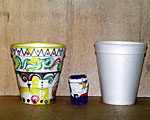|
|
  TODAY'S WEATHER Windy and Rainy 78°F (25.6°C) Latitude: 25 deg 20.3’S Longitude: 70 deg 02.3’E Wind Direction: SSE Wind Speed: 25 Knots Sea State 4 Swell(s) Height: 15-18 Foot Sea Temperature: 79°F (26.1°C) Barometric Pressure: 1014.0 MB Visibility: 5 Nautical Miles  When a Styrofoam cup descends to great depths, it shrinks, like the cup in the middle. 
Read your poems and stories  Daily Update: Honey, I shrunk the cups Scientists Bob Collier and Charlotte Meredith brought an unusual catch in with the CTD sensor this afternoon - miniature Styrofoam cups. The cups descended into the Indian Ocean this morning the size of regular coffee cups, but as they encountered the increasing pressure down to depths of 3,300 meters (almost two miles), they shrunk to the height of golf tees. Bob’s
eight-year-old daughter, Elise, and her third grade class at
Harding Elementary School in Corvallis, Oregon decorated 28 Styrofoam
cups in bright fish, happy faces and American flags. Bob will
deliver the mini-cups to the class, along with a lesson on ocean
pressure, after this expedition. Tonight
we will use the CTD for more measurements and water sampling,
factoring in the southern current flow to close in on possible
plume target areas. When we get close enough and when the seas
subside, we will lower cameras and other tools to pinpoint the
yet-unidentified hydrothermal vents that are the sources of the
plume. “It’s my Mom’s recipe,” said Dan “It has become a tradition that I cook on every cruise I go on. I do this as a small token of appreciation for all the hard work of the ship’s crew.” Happy eaters exited the galley rubbing round stomachs and mumbling intentions to “get on that exercise bike first thing tomorrow.”
|
||||||||||||||||||||||||||||||||||||||||||||||||||||||||||||||||||||||||||||||||||||||||||||||||||||||||||||||||||
Mailing List | Feedback | Glossary | For Teachers | About Us | Contact
© 2010 Dive and Discover™. Dive and Discover™ is a registered trademark of
Woods
Hole Oceanographic Institution
